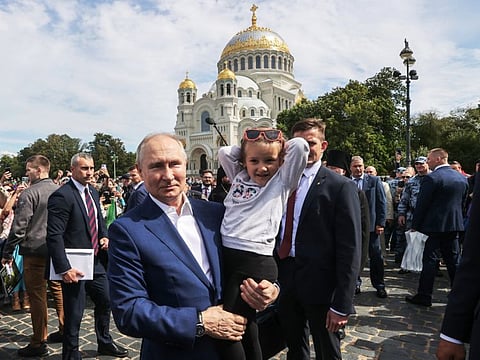Putin hosts Belarus leader, calls Ukraine’s counter-offensive a failure
We are controlling what is happening with Wagner, Lukashenko says

Moscow: Russian President Vladimir Putin said Ukraine’s counteroffensive “has failed” as he hosted Belarusian leader Alexander Lukashenko, his close ally, for talks in St Petersburg on Sunday.
“There is no counteroffensive,” Russian news agencies quoted Lukashenko as saying.
Putin replied: “It exists, but it has failed.” Ukraine began its long-anticipated counter-offensive last month but has so far made only small gains against well entrenched Russian forces who control more than a sixth of its territory after nearly 17 months of war.
US General Mark Milley, chair of the Joint Chiefs of Staff, said on Tuesday the Ukrainian drive was “far from a failure” but would be long, hard and bloody.
A Telegram channel linked to Lukashenko quoted him as saying in a jocular tone that fighters of Russia’s Wagner mercenary group who are now training Belarus’s army were keen to push across the border into Nato member Poland.
“The Wagner guys have started to stress us - they want to go west. ‘Let’s go on a trip to Warsaw and Rzeszow’,” he was quoted as saying. There was no indication that Lukashenko was seriously entertaining that idea.
“I am keeping them in central Belarus, like we agreed. ... We are controlling what is happening” with Wagner, he later said.
On Thursday, the Belarusian defence ministry said Wagner fighters had started to train Belarusian special forces at a military range just a few miles from the Polish border.
Poland is moving extra troops towards the border with Belarus in response to the arrival of the Wagner forces who relocated there after staging a short-lived mutiny in Russia last month.
Putin, in response, warned Poland on Friday that any aggression against Belarus would be considered an attack on Russia. He said Moscow would use all means it has to react to any hostility towards Minsk.
USEFUL PARTNER
Russia and Belarus are linked in a partnership called the “union state” in which Moscow is by far the dominant player. But Lukashenko has proved his usefulness to Putin since the February 2022 invasion of Ukraine, allowing Russia to use his country as a launch pad at the start of the war.
He has subsequently let Russian forces train at his military bases, conducted frequent joint exercises and taken delivery of tactical nuclear weapons which Putin has placed in Belarus in a move broadly condemned in the West.
The Kremlin also credited Lukashenko with brokering last month’s deal to end the Wagner mutiny, which Putin said had briefly threatened to tip Russia into civil war.
Putin said the two leaders would meet on Monday and would discuss security and other issues “in great detail and in depth”.
Lukashenko has not committed his small army to join Russia’s war, but the risk of a new attack from Belarusian soil compels Ukraine to protect its northern border, stretching its forces as it tries to step up its counteroffensive in the east and south of the country.
Russian attack on Odesa kills one, damages cathedral
ODESA: A Russian air attack on Ukraine’s southern port of Odesa early on Sunday killed one, injured nearly 20 and badly damaged an Orthodox cathedral, Ukrainian officials said, adding the icon of the patroness of the city had been retrieved from under the rubble. “Odesa: another night attack of the monsters,” Oleh Kiper, governor of the Odesa region, said on the Telegram messaging app. One person was killed and 19 injured, including four children, in the missile attacks that also destroyed six houses and apartment buildings. Fourteen people were hospitalised, he said. The Spaso-Preobrazhenskyi Cathedral, or the Transfiguration Cathedral, was severely damaged, Odesa’s military administration said. Odesa’s largest church building, it is located in the historic city centre, which is a Unesco world heritage site. On the Black Sea in Odesa, locals looked in disbelief as the Transfiguration Cathedral - originally built in 1794 under imperial Russian rule - was badly damaged. The cathedral’s archdeacon, Andriy Palchuk, told Reuters the missile strike had started a fire which only affected one corner of the cathedral containing non-historic religious artefacts for purchase by worshippers. “When the right altar chapel - of the most sacred part of the cathedral - was hit, a missile piece flew through the whole cathedral and hit the area where we display icons, candles and books for purchase,” he said. Ukraine’s defence ministry said the cathedral had now been “destroyed twice” - by Russian President Vladimir Putin and Soviet leader Joseph Stalin. The early 19th-century cathedral was demolished in 1936 as part of Stalin’s anti-religious campaigns and rebuilt when Ukraine gained independence from Moscow in 1991.



